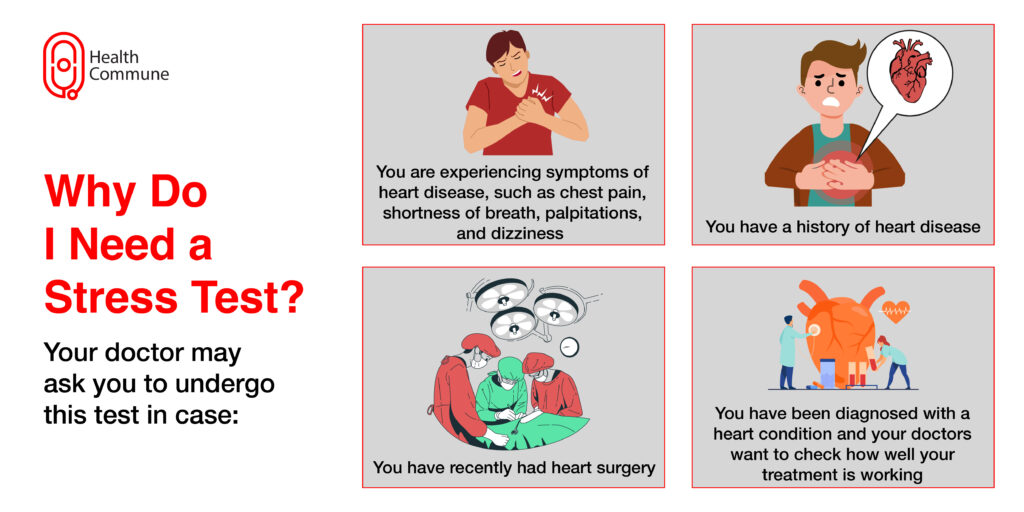Here’s one test you don’t need to prepare for. Learn all about the exercise stress test, why it’s done, what it measures, and why it’s important.
What is an exercise stress test?
An exercise stress test, also known as a treadmill test, is done to learn how well your heart functions during physical exertion. Your doctor hooks you up to an ECG and asks you to walk on a treadmill to measure your heart function.
What does a stress test show?
This test measures:
- How effectively your heart pumps blood
- If your heart is receiving enough blood or any blockages
- What intensity of exercise is safe for you
- How severe your heart condition is
- How well is your heart treatment working
- If you’re at an increased risk of heart disease
- Blood pressure changes in response to exercise in patients with borderline hypertension
Why do I need a stress test?
Your doctor may ask you to undergo this test in case:
- You’re experiencing symptoms of heart disease, such as chest pain, shortness of breath, palpitations, and dizziness
- You have a history of heart disease
- You have been diagnosed with a heart condition and your doctors want to check how well your treatment is working
- You’ve recently had heart surgery

What are the types of stress tests?
Stress tests can be of the following types:
- Exercise stress test: In this, you will be asked to walk on a treadmill as an ECG records your heart activity
- Nuclear stress test: In this, you’ll be injected with a radiopaque dye through an IV line that will allow your doctor to visualise your heart as you walk on the treadmill
- Stress echocardiography: This combines the treadmill stress test with echocardiography to capture the dynamic motions of your heart
What happens before a stress test?
Your doctor will take a complete medical history, which includes the frequency and intensity of your exercise. You can ask them any questions you have at this time. Some instructions for your test include:
- Wear comfortable, loose-fitting clothes and shoes
- Don’t eat or drink coffee or tea three hours before the test
- Don’t smoke before the test
- Disclose all medicines you regularly take including any over-the-counter medicines, vitamins, herbal supplements, and ayurvedic and homoeopathic medicines. Based on your doctor’s recommendation, you may have to stop taking some of them before your test
- Report any kind of symptoms that you may experience on the day of the test, such as chest pain, and palpitations
What happens during a stress test?
During your test:
- You’re taken to the exercise laboratory, and your resting heart rate and blood pressure are recorded
- You’ll have to remove all your clothes and valuables and wear a hospital gown
- Small electrodes will be attached to your chest, shoulders, and hips and connected to the ECG
- You’ll be asked to slowly walk on a treadmill. The speed and inclination of the treadmill are increased every few minutes according to a pre-programmed protocol until you achieve the target heart rate (based on age, sex, and fitness levels)
- Once you reach the target heart rate, you’ll be asked to continue walking while your heart function is recorded
- If you experience any difficulties, you can ask to stop the test
- After the test, your vitals are monitored until they return to your normal resting state
How long does the test take?
The test takes approximately 1 hour, while the actual exercise time is around 10-15 minutes.
What happens after the test?
There are generally no side effects once you return to your normal resting state. You may experience slight muscle soreness if you’re not exercising.If you have any of the following symptoms, visit your doctor immediately:
- Constricting or squeezing type of chest pain that is radiates to your arm, jaw, neck, or shoulders
- Breathlessness
- Palpitations
- Light-headedness or fainting
Are there any risks to the test?
While this test is generally safe, if you have any medical conditions, discuss them with your doctor, as it can aggravate certain conditions such as unstable angina, aortic dissection, and pulmonary embolism.
What if I am unable to exercise?
In case you are unable to do the treadmill stress test, you will be given drugs that stimulate the effect of exercise on your heart.
When will I get the test results?
You’ll get your preliminary results before you leave the exercise laboratory, while the final results can take a few days. Based on the results, your doctor will map out the best course of treatment for you.
Who should not have cardiac stress testing?
You should not undergo this test if:
- You’ve experienced a heart attack in the past 2 days
- You have heart failure
- You have unstable angina
- You have uncontrolled arrhythmia
- You have severe aortic stenosis
- You have an acute aortic dissection


